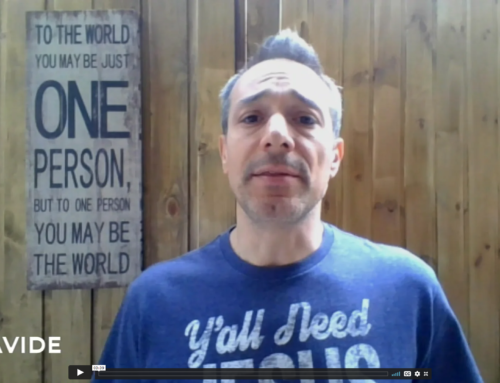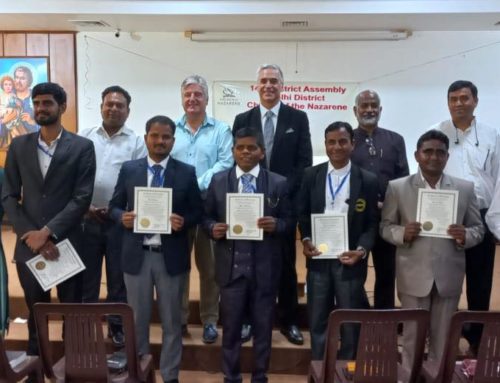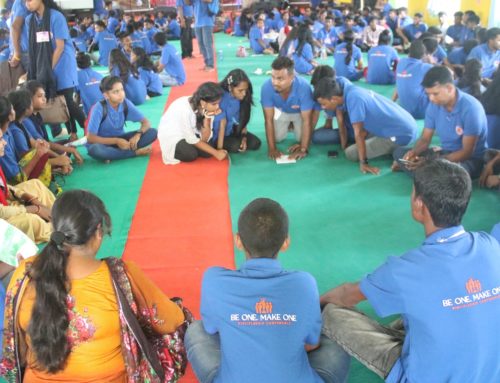In the last six months distances in Russia have gotten a lot smaller. This is neither because the country has shrunk, nor because someone came up with a faster means of transportation to shorten travel time across the immense and wild Russian territory. Yet European Nazarene College (EuNC) students and teachers in Russia can say that they are a lot closer now than they ever were before. And it’s because of the global Nazarene video conference system utilizing a product called Vidyo, which EuNC uses to communicate.
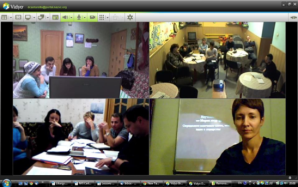 Distance has always been one of the many difficulties in delivering education in Russia. There are groups of students distributed across some of the main cities of Western Russia, but they are hundreds of kilometers apart. Also, most teachers live in the north and cannot always spend extended time with the students located in the south. In the past, students were brought together in the summer for four weeks of residential, intensive courses, but in the last few years students have found it difficult to be gone from their ministries, family and work places for so long.
Distance has always been one of the many difficulties in delivering education in Russia. There are groups of students distributed across some of the main cities of Western Russia, but they are hundreds of kilometers apart. Also, most teachers live in the north and cannot always spend extended time with the students located in the south. In the past, students were brought together in the summer for four weeks of residential, intensive courses, but in the last few years students have found it difficult to be gone from their ministries, family and work places for so long.
Vidyo has provided a valid, more flexible solution to the problem. In the spring semester, Tanya and Davide Cantarella co-taught Spiritual Formation to students in Moscow, Chaltyr and Volgograd. This was the first time to teach a class with Vidyo, and both of them were very hesitant about the way things would turn out. To their surprise, however, the students at the end of the class were rather enthusiastic. They had been able to take a class, interact with the teachers and other students, and without leaving their place of work and ministry.
This positive experience convinced everyone that this was an avenue worth exploring further. So, in November Tatiana Cantarella started teaching a class on leadership. Twenty-one students enrolled in the class, most of whom are located at least a thousand kilometers from the teacher’s location.
“It’s a unique opportunity to have an incredible variety of students that would be impossible otherwise,” says Tatiana, “and it’s great to have the opportunity to listen to each other and share with each other insights about the class.”
At times there are hiccups in the connection. Every once in a while a group may get disconnected for a short time. It has also happened that a group may have difficulties getting the connection back. In order to limit the impact of the shortfalls of technology, lectures are usually also video- recorded and then posted online so that students can easily catch-up on what they missed within a couple of days.
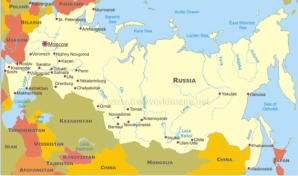 “Of course the system is not perfect,” said CIS Field Education Coordinator Davide Cantarella, “but it is a huge step forward in delivering education to the students right there where they are, in a flexible format that is both personal and effective. With the growth and development of internet infrastructure in Russia, it can only get better.”
“Of course the system is not perfect,” said CIS Field Education Coordinator Davide Cantarella, “but it is a huge step forward in delivering education to the students right there where they are, in a flexible format that is both personal and effective. With the growth and development of internet infrastructure in Russia, it can only get better.”
The use of technology is moving education forward in Russia and in the CIS Field. The experience with video-conference in Russia will soon spread to other Learning Centres on the field and will increase the flexibility of the delivery system and frequency of courses offered.
At the same time, the opportunities to serve students from a distance continue to place a great responsibility on the teachers’ shoulders. Microsoft founder Bill Gates is credited as having said that, “Technology is just a tool. In terms of getting the kids working together and motivating them, the teacher is the most important.”
Encouraging and motivating students will always have to be a priority, which is only made more difficult by distance. Yet, knowing that a video call between students and teacher is only one click away can increase out-of-class interaction and mentorship, as well as create stronger ties across Teaching Locations, Districts, and Learning Centers.

